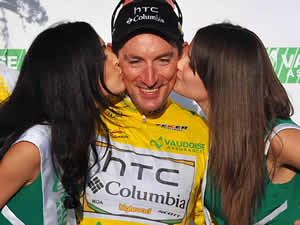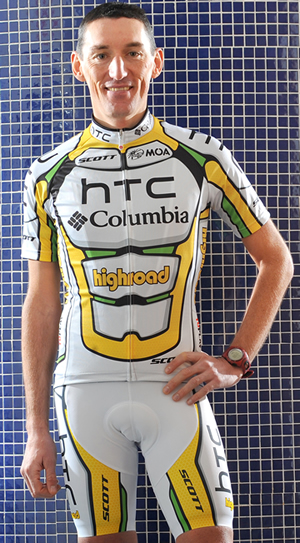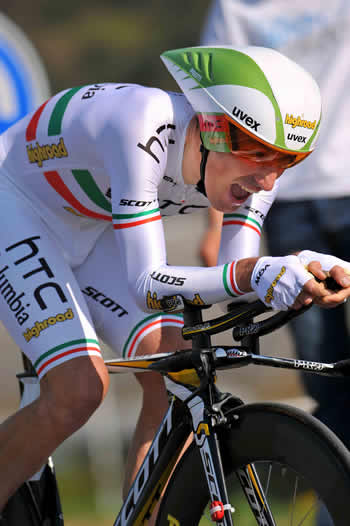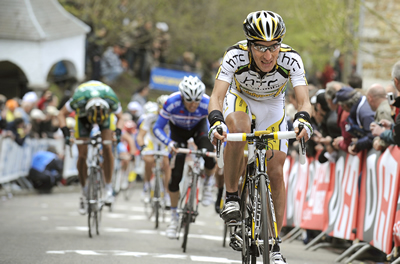
Marco Pinotti of HTC_Columbia won the prologue yesterday in the Tour of Romandie, I caught up with him last week at his home in Italy
All images © TDWsport.com
schmalz Today we are here with Marco Pinotti from HTC-Columbia, how are you Marco?
Pinotti Fine, thank you, very well.
schmalz I’ve been wanting to talk to you since the piece you wrote for Cycle Sport magazine came out, which was your seven keys to performance. A good portion of it was dedication and different aspects of training, but then your seventh key was morality—which is something you almost never hear about in regard to training. It was something that really caught me by surprise, and I was pleasantly surprised by that. Why did you choose to include that?
Pinotti Because in every aspect of your life, everything you do, you should do it according to your values. From that point of view, morality is important; otherwise if what you do doesn’t comes from what your values are based on, you are going to have a breakdown. It has to go together. My opinion is that you will feel complete when you do something if you do it according to your moral values.
schmalz Right, because we have seen successes from people—especially over the span of your career, you started in 1999— we’ve seen some victories from people who weren’t necessarily the greatest people, morality-wise. I think that after their careers, especially in the case of Marco Pantani, this really haunted them.
Pinotti Yeah, yeah, I think that could be a reason because they had problems not only in the sport but outside because their life isn’t balanced between their moral values and what they have been doing. So you will have conflicts with yourself, sooner or later. If you have been acting against your values, if you have been doing something that is not right, in some way you are going to pay. That’s something you should always keep in mind when you do something, just think if you really need it and if it goes with what you really believe in.
If you have been acting against your values, if you have been doing something that is not right, in some way you are going to pay.
schmalz Where does your moral standing come from?
Pinotti It comes from my parents. Where I grew up, all the values I believe in, I took from my parents. So I need to thank them. In a way, even when I didn’t know it, I think they have been acting like moralists for me. The values I have now, they come from my parents.
schmalz You’ve never had any moral issues in your career. Racing in the era that you did—did you ever feel that the people that you’ve raced against were getting one over on you—that they were cheating you because they were using performance enhancing drugs? Did you ever feel cheated or angry at people who were using drugs when you weren’t?
Pinotti Yes, but not in the moment—after they tested positive. Because you can’t think that the others are cheating if you don’t have proof, otherwise you create a reason for yourself to underperform. You can’t let yourself think about this. You just have to do what you can do. But at the point when they test positive, and when you think back, yeah, I feel like they stole something from me.
schmalz Do you get angry, do you get frustrated?
Pinotti The first reaction is anger and also disappointment, but then after I think "Maybe they’ve received a lesson." And they have the chance to learn from that lesson. I think from their point of view they have to face a hard moment, and I hope that they can learn from it. So at the beginning it’s disappointment and at the end I think it’s a good lesson for them.
schmalz You were pretty critical of Diluca in the Cycle Sport article—were there any repercussions from calling him out?
Pinotti No, I didn’t get any repercussions, the peloton is not the bad group some people think is.
schmalz Did you ever feel pressure to dope (either directly or indirectly) during your career, if so how did you handle it?
Pinotti Not directly, when you get the feeling everybody is doing it; you kinda feel you can do the same. My parents taught me not to look too much at bad behavior. But especially in the last 5 yrs I don’t have this feeling, on the contrary, I believe most of my competitors are clean.
schmalz How do you rate the moral state of the peloton from when you started in ’99 until now is it better?
Pinotti It’s got a lot better, I think. In the end the moral values don’t change among the people much, but the environment has changed a lot. There are a lot of teams that really have placed a lot of emphasis on racing according to the rules, and not just looking at being first in the results. The environment changed a lot and the values that were hidden inside, now they have sprung up.
schmalz It seems that most of the riders that are coming up don’t really consider the doping option because it seems to have been curtailed by both the doping controls and the teams themselves, but there are certain exceptions, like Riccardo Ricco, from the evidence that we have, has always been cheating in some way. Was he on Saunier Duval at the same time you were?
Pinotti Yeah, he turned pro in 2006. We raced together for one year.
schmalz What was your opinion of him?
Pinotti You could see immediately that he really was a strong character. Meaning when he had a goal in mind, he wanted to achieve it. It was his strength to go straight on his road. The more people criticized him, the more strength he had; because he’s a really strong character. Without taking into account all the mistakes, he is really strong character—I don’t know how to say it in English—but he goes on his own.
Without taking into account all the mistakes, he is really strong character—I don’t know how to say it in English—but he goes on his own.
schmalz It seems like he was willing to be successful by any means possible, obviously because he took CERA. It seems like he fell into that temptation because he wanted to get done what he wanted to get done, and in order to do that, he took the short cut.
Pinotti I think he was taking it because he thought it was the thing to do to perform well, and he was thinking that his competitors were doing it. That’s was his attitude, if you think that the others are taking something, then you feel you are allowed to take it also.
schmalz Do you think that’s the case, or is that an outdated way of thinking in the pro peloton these days—that you have to take something to keep up? I think that attitude was prevalent in the 90s, but do you think that’s still a common feeling these days?
Pinotti No, I don’t think that most people think that. There are a few people that still think that, but maybe they are made to think that way by other people.
schmalz Yeah, there’s still some hold outs who still think they need to get that edge.
Pinotti They haven’t found the right support, the right environment, that can make them believe in their own strength without finding pharmaceutical help.
schmalz In cycling, a lot of your strength and power comes from self-confidence, and if you have a couple of bad days or a bad race, that can shake your confidence, and open you up to that temptation.
Pinotti Yeah, that’s true, but one thing I learned in my career is you will have bad days, but on these bad days that’s when you get stronger. Sometimes it’s just a bad day and you have to move on and sooner or later you are going to find good days.
schmalz You’ve had a long career, and you’re definitely not the type of professional who has stayed set in his ways, you try to learn and improve yourself in one way or another every time you go training…
Pinotti Yeah, I was thinking about my career—yesterday I did Felche and I was thinking the first time I did it was in 2003, it seemed like such a hard race to finish. And now, yesterday, I was almost complaining that it wasn’t hard enough—we were still 90 riders at the bottom of the last climb. So I thought I wasn’t really training well 6 or 7 years ago. I think I’ve started training—not more or better in the last few years—but I needed to teach my body to train more, because at 22 or 23 years old you cannot sustain such a workload, it’s something your body learns year after year.
schmalz Didn’t you say it took you ten years to become a bike racer?
Pinotti Yes, because it’s an endurance sport and year after year your body adapts, you lose some strength, but I really feel a lot stronger now than ten years ago. (laughs) And ten years ago, I wouldn’t have believed that I could be like I am now.
schmalz So you’ve become much stronger and now you can complain about how easy Flèche Wallonne was this year.
Pinotti (laughs) No, no, no, I’m not complaining! I was thinking, "Oh, they have changed the parcours." But I looked and I saw the parcours is 90% unchanged. These races used to look so hard, but now, it’s still hard, but I can be near the lead in the end.
schmalz How does the Huy at Fleche compare to other climbs that you’ve done in races? Is it one of the hardest climbs? Because it makes the race explode at the end.
Pinotti Yeah, it’s not a hard climb itself, but they do the last kilometer in less than three minutes. So the average power for the riders in the top three is more than 7.5 watts per kilo. It’s something that very few people can stand. So it’s going to explode because the riders that are going to do the sprint are maybe one third of the peloton because the others have been working before to put their leaders in good position for the climb—so they expend a lot of energy and drop off. Other riders who don’t believe they can win they try everything before the climb, they arrive at the bottom of the climb at the limit. And then you still have the sprint, and the sprint you do almost full gas from the bottom it’s a survival thing to the top.
schmalz It seems like experienced riders who know their way around Flèche Wallonne do really well at that race. For instance, this year, Alberto Contador might’ve been surprised by the steepness of the Huy at the end, and got passed by Cadel Evans, who has done it more times than Alberto has.
Pinotti Yeah, the last part you need the legs but you also need—because the last 400 meters, you don’t know until you do it—you can gain a lot of time if you are still fresh. The key is you have to be there with still good legs, but have to go and still have legs for the final kick. It’s something that you really need to experience, but you need the good legs to be successful.
schmalz Did you have advice for the younger racers on the team before the race?
Pinotti Ah, no, the best learning you get from yourself. Every bike rider is different, especially on this climb, every bike rider has their own speed, and sometimes the best learning is from mistakes. Because I can tell a rider to "do this", but that is something that comes from me—maybe he behaves differently on the bike. If they ask me, of course, I give my opinion and my thoughts about the question, but then they have to do it themselves.
schmalz Sometimes it’s just a pain you have to experience yourself.
Pinotti Yeah.
schmalz You’ve had a long career, what keeps you going as a pro? What keeps you motivated?
Pinotti It’s the good team I’ve found—I enjoy going to the races. We have an amazing group of people, riders and staff. But aside from this, I’d like to go to the Olympic Games. Because I felt I lost out on being in the Olympic games in 2004 and 2008, so my goal is to definitely to go to London in 2012.
schmalz It seems you’d be a good choice because you do so well in the time trial, and you’ve been Italian Champion four times, so you think that’s the route you’re going to take?
Pinotti I am going to try for the time trial.
schmalz Are you scheduled for the Giro this year or are you going to do the Tour this year?
Pinotti My schedule is for the Giro. I will do Romandie and after that, the Giro.
schmalz How many Giro participations do you have?
Pinotti I started in 2005, and from then I haven’t missed a year, so I have five. The next one will be my sixth Giro.
schmalz Is there a way to explain to an American audience how special the Giro is to Italian riders.
Pinotti (laughs) It’s special because our country is so nice—even an Italian doesn’t know his country—so every time I do the Giro I discover something about my country, and beside that the racing, it’s the race that all the people look to. I’ve done the Tour, and I’ve done good things during the Tour, but nobody cares because the Tour is more recognized at the world level, but in Italy in July people are maybe on holiday, but in the Giro their eyes are on cycling. It becomes very popular, it means more to win the Giro for an Italian rider.
schmalz The finishes at the Giro for the stage wins are so hotly contested, the sprints are extra tough because everyone is trying so hard to win those stages, there’s so many risks taken among the Italians because you can tell that those stage wins are so important to them, It’s amazing, it’s a great race to watch.
Pinotti In the Tour, people are going to take more risks, in the Giro they always like to put some drama in the end, so it’s never an easy stage finish. There’s more mountains, more villages at the top, there’s narrow roads—there’s always something special every day to have some drama or some suspense in the stages.
In the Tour, people are going to take more risks, in the Giro they always like to put some drama in the end, so it’s never an easy stage finish.
schmalz Sure, and last year there was extra drama because Lance was involved in the race…
Pinotti Yeah, yeah, and the way the Giro finished was unbelievable. You couldn’t plan for a more dramatic finish with Menchov crashing in the last kilometer.
schmalz Yes, and from a fan’s point of view the racing was much more exciting.
Pinotti Yeah but for a rider sometimes it’s too stressful. (laughs). I swear to God.
schmalz Is the pace of a Giro stage different from a Tour stage? These days the Tour stages are pretty hotly contested at the beginning, they settle in, and then they heat up at the end. Is the Giro the same way?
Pinotti The difference I think is in the people, in the Giro now all the competitors start at a good level, with the Giro as a big goal; but the Tour still is the goal with the big "G". Basically the form of the people is a bit higher in the Tour, and the competitors are stronger in the Tour—that makes the difference. All the big riders go for the Tour, so the pace is a little bit faster. All the media are there so there are more people involved—the Tour is bigger, and that makes the race more stressful, more fast. Since the ProTour came about, the way we race is really similar because before the Giro was more relaxed; now it’s really raced also from the start in the Giro. But I think the level is higher in the Tour.
schmalz And on one will use the Tour as training, where some people will use the Giro to train.
Pinotti Yeah, no one uses the Tour for training. There could be some riders in the past that could use the Tour for the World Cup races in September, but now the World Championship is not until the end of September. You can’t go to the Tour to train because otherwise you’re dropped—you’d really suffer a lot.
schmalz You have to be in top shape from the first day. You’ve raced so long in Italy, you’ve had to come across Salvatore Commesso, it seems that everybody has some sort of story about Salvatore, just because I think he’s a big personality.
Pinotti Yeah, he was from the south of Italy, but he moved only 30ks from me, and sometimes we train together, and for sure he’s a funny guy. He has a naive way of training, he really goes by feeling. Like when he has his period of training for the National Championship, which he’s won twice, he’s really focused on training. And sometimes in the winter, he just takes it a little bit easier. But he’s a guy who trains a lot by feeling, and always likes to make jokes.
schmalz Does he have you rolling up your jersey sleeves to get the tan on your upper arms?
Pinotti (laughs) No, no, no. In the summer he trains with his sleeves up, he even trains without the jersey sometimes. (laughs).
schmalz So he’s rolling through the country side topless, that’s sounds a lot like Salvatore. Marco, it’s been an absolute joy talking to you, best of luck in your upcoming races.
Pinotti OK, thank you.

“yesterday I did Felche and I was thinking the first time I did it was in 2003”
schmalz: So he’s rolling through the country side topless, that’s sounds a lot like Salvatore. Marco, it’s been an absolute joy talking to you, best of luck in your upcoming races.
J-Lo used to rock the topless/HR strap tan, I wonder if he still does?
This guy needs to bulk up a little bit. He’s almost like Janez Brozhovic (spelling?) from the Discovery/Astana teams.
However, he is still better than me.
“This guy needs to bulk up”!!?? who the fuk are you? ‘Cause this guy is the guy that has 3 italian TT champs and more recently yesterdays stage on his palmares…
The guys prepping for the Giro, he’s going to be light. He’s a cyclist, not a football player.
Punters advising the pro’s on what they should be doing makes me laugh. sit back and listen to yourself.
Does he need to bulk up to win?
great interview. seems like a very decent guy.
ps. i think he means fleche not felche.
nice interview. that was a hell of a win too.
Great interview!
LA used the tour last year as training to beat a 45 year old local guy out in Leadville
That was an awesome interview. Enjoyed it start to finish. Thank you!
did you ask him…
Greipel or Cavendish???
What time is it?
Moving violation, that was hysterical.
Great interview, and great typo.
Great to see the site getting interviews with all of the big names we know but not so much known by the american masses.
The Toto bib only dress code was a bit disturbing but ended the interview on a really funny note. I forgot how much he struggled with the scales come race time.